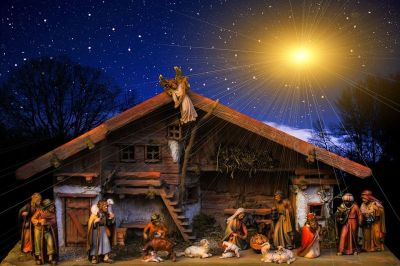The Christmas miracle in the sky

“After Jesus was born in Bethlehem of Judea in the days of Herod the king, behold, wise men from the east came to Jerusalem, saying, “Where is he who has been born king of the Jews? For we saw his star when it rose and have come to worship him.”” - Matthew 2:1–2
They say it was Halley’s Comet.
Or they say it was the convergence of Saturn and Jupiter, sparkling with unusual brightness because of their planetary alignment in the nighttime sky.
They say it might even have occurred within the constellation Pisces—the zodiac sign of the fish—as if this part of the hypothesis should make Christians feel adequately patronized, if we insist on reading a mystical meaning into the “star” of Matthew 2. They say it was for sure uncanny, though not unheard of.
What they don’t say—what they will never say—is what it truly was: A miracle!
But wouldn’t “miracle” actually make a lot more sense? Doesn’t all of creation shout “Creator?” Doesn’t the galactic choreography of the heavens declare that someone did this? Is there really a more plausible explanation for the universe than what the Bible simply comes out and says, that God spoke the whole thing into existence?
And if he’d already made more stars than could ever be counted, how hard would it have been for Him to make another one, and then to move it around to put it exactly where He wanted, exactly when He wanted it to be there?
We at least know the wise men considered this star worth investigating. It obviously went beyond their understanding of astronomy. Maybe they knew of some of the Old Testament prophecies, like this one which had been spoken centuries before: “I see him, but not now; I behold him, but not near: a star shall come out of Jacob, and a scepter shall rise out of Israel” (Numbers 24:17). They knew enough to be amazed.
So they would never have bought the notion that nothing miraculous was taking place, or that this star didn’t make reference to a king to be worshiped—any more than they bought Herod’s lunatic line about, “When you have found him, bring me word, that I too may come and worship him” (Matthew 2:8). These wise men weren’t fools enough to believe his lies or explain it all away.
Neither should we be. May God forgive us the arrogance of translating our postage stamp’s worth of total knowledge into rational explanations for everything we see. The greatest rationality of all is the recognition that rationality itself is incomplete as a way of knowing. There is a supernatural part that outweighs and outsmarts us. There is a God far more powerful than the theories of any high school science teacher or university professor.
I don’t know how a star of such significance appeared in the eastern sky. I don’t know how it “came to rest over the place where the child was” (Matthew 2:9)—not over a city, not over a block, not over a street, but over a house. We’re not really told, so we apparently don’t need to know.
Except that it was a miracle. Something miraculous happened. And the proper response is not skepticism or rational explaining but adoring worship.





















